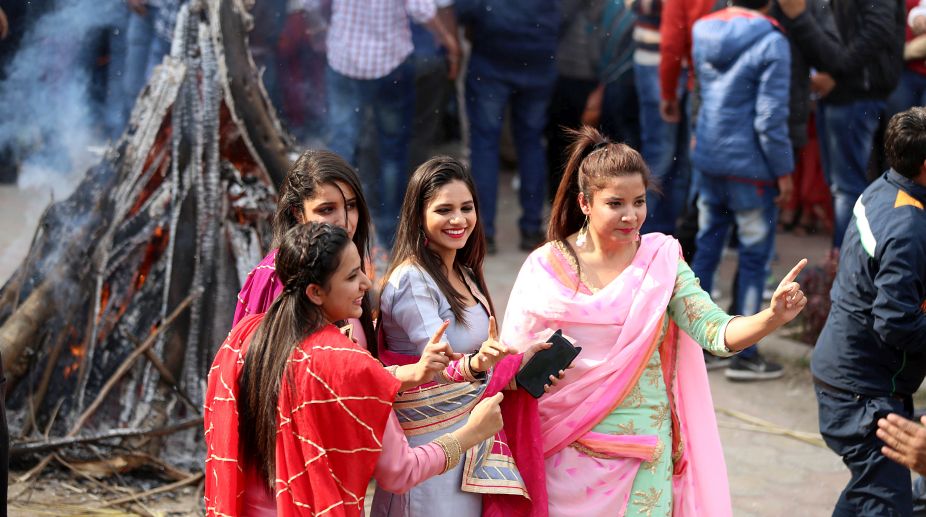Lohri is one of the most popular festivals celebrated among Punjabis in India. The festival of Lohri has many renowned legends associated with it and the legend of Dulla Bhatti is considered the most significant of them.
Lohri marks the end of winter on the last day of ‘Poush’ and beginning of ‘Magha’ which is exactly when the sun changes its course.
Advertisement
The legend of Sun God
A few days before Lohri, village maidens assemble and visit the households to ask for cow-dung cakes. The girls gather around the house and chant: ‘We’ve come, all the girls of the village! We’ve come to your courtyard!’, and so they go from house to house collecting cow-dung cakes till they have a veritable pile. They deposit all of them in one house and return to their homes. This ritual has a valid reason behind it that has been passed down by their forefathers.
As Lohri is celebrated on the last day of the month of ‘Poush’ to mark the end of winter, it is said that the forefathers formulated a sacred mantra which would protect them from the cold. This mantra was created to invoke the Sun God to send them so much heat that the winter cold would not affect them. And, in thanksgiving to the Sun God, they chanted this mantra round a fire on the last day of ‘Poush’. The Lohri fire is symbolic of the homage to the sun. A song is sung on this occasion:
“Where have the shawls and braziers gone?
To the golden mountain Where’s the golden mountain gone?
To the sun’s ray Where has the sun’s ray gone?
To the sun Where’s the sun gone?
To the fire The fire burns, the ray warms
The snows melt, the cold days have ended.”
Our ancients believed that the flames of the fires they lit took their message to the sun, and that is why on the morning after Lohri, which is the first of the new month Magh, the sun’s rays would suddenly turn warm and take the chill away from the people’s bones.
Another version of Lohri
In another version of Lohri’s legend and tales it is said that in olden times, human beings lit fires to keep away flesh-eating animals and protect their habitations. Everyone in the community would contribute to the fire for which young boys and girls would collect firewood from the jungle to burn.
That is the reason why even today people burn cow dung cakes and it is the teenager who go and collect them. The Lohri bonfire is considered as an old symbol of protecting oneself with the community and it is also considered as a form of fire worship. The Lohri fire is holy and it is to this fire that couples pray for more children and parents for husbands for their unmarried daughter.
The Legend of Dullah Bhatti
On the eve of Lohri the most popular songs sung by groups of boys and girls that invariably end with the exclamation ‘ho’:
Sunder mundriye ho!
Tera kaun vicharaa ho!
Dullah Bhatti walla ho!
Dullhe di dhee vyayae ho!
Ser shakkar payee ho!
Kudi da laal pathaka ho!
Kudi da saalu paata ho!
Salu kaun samete!
Chacha gali dese!
Chache choori kutti! zamidara lutti!
Zamindaar sudhaye!
Bum Bum bhole aaye!
Ek bhola reh gaya!
Sipahee far ke lai gaya!
Sipahee ne mari itt!
Bhaanvey ro te bhaanvey pitt!
Sanoo de de Lohri, te teri jeeve jodi!
(Laugh, cry or howl!)
Lohri is a festival that is associated with weddings and hence many Lohri songs are based on the stories of Dulla Bhatti. Dulla Bhatti is a tale of a man that used to steal from the rich and rescue girls sold off to the Mughals. He used to rescue the girls and provide for them, including a suitable man for their weddings.
The song exhorts the youth to protect the honour of their sisters, daughters and punish those who try to dishonour them. His songs of heroism and valour are sung and recite everywhere in Punjab.
The legend of the two sisters
According to another legend, Holika and Lohri were actually sisters. After an order given from Harnakash, Holika took Prahlad and Lohri to sit in the fire, while Holika perished in the Holi fire, her sister Lohri survived the trail with Prahlad.
The derivation of the name ‘Lohri’
Some people believe that Lohri has derived its name from Loi, who was the wife of Saint Kabir. There also another legend that suggests that Lohri comes from the word ‘loh’, which means the light and the warmness of fire.
Eating of ’til’ (sesame seeds) and ‘rorhi’ is considered to be essential on Lohri day which why perhaps the words ‘til’ and ‘rorhi’ merged to become ’tilorhi’, which eventually got shortened to Lohri.
















